|
Music Is The Healing Force Of The Universe The Inconsistency of |
|
|
||||||||||||||||
|
July 1 2023
More Lost Performances Revisited |
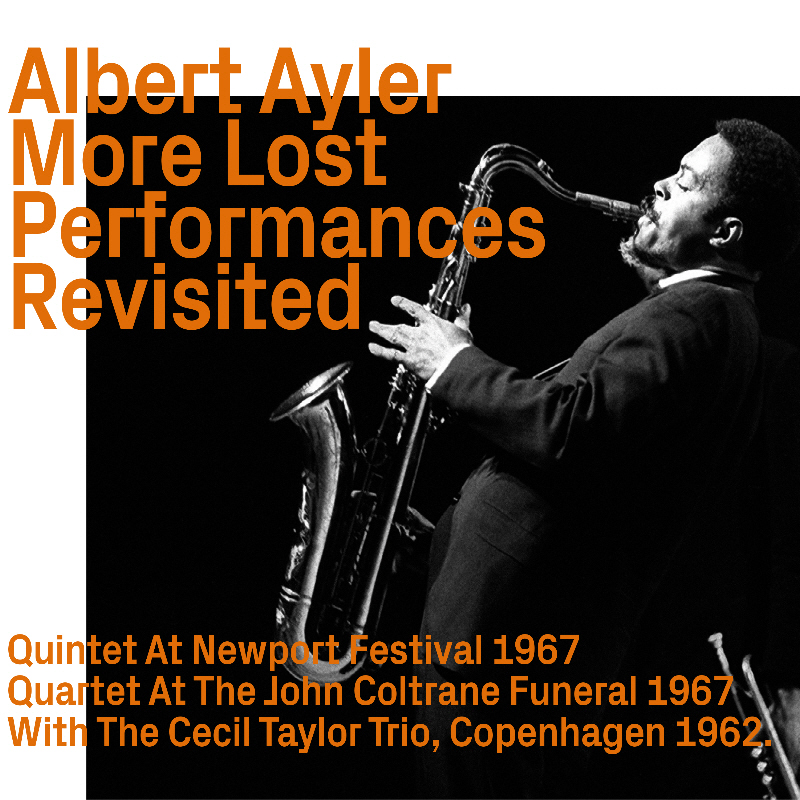 |
||||||||||||||||||||||||||||||||||||||||||||||||||||||
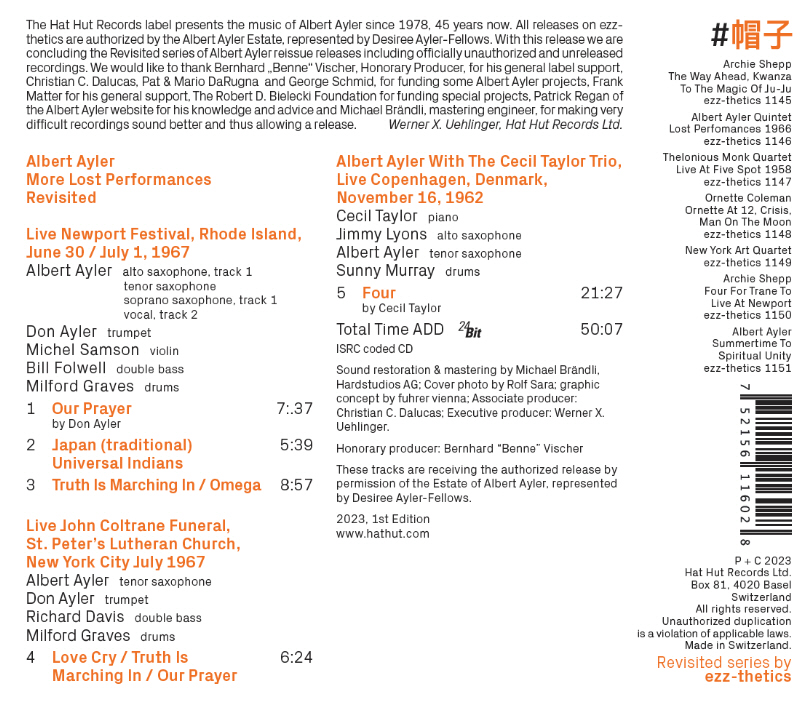 |
||||||||||||||||||||||||||||||||||||||||||||||||||||||
|
The final entry in the series of ‘Albert Ayler Revisited’ albums released by Hat Hut Records is More Lost Performances (ezz-thetics 1160), currently available to download from bandcamp, and due for release as a CD in July. Three ‘sessions’: Ayler’s only recorded performance with Cecil Taylor from a Danish TV broadcast (video presumed lost) in 1962, Ayler’s only appearance at the Newport Jazz Festival and the iconic recording of Ayler’s contribution to the funeral of John Coltrane. Long circulated as bootleg items, these three ‘sessions’ finally saw the, albeit brief, light of day as part of the Holy Ghost box set. Now released again, suitably burnished by Michael Brändli, More Lost Performances is a welcome addition to the Ayler catalogue and a suitable swansong to the ‘Albert Ayler Revisited’ series, especially since it contains that iconic 6 minutes of sound from the Coltrane funeral. I put it that way since it is never going to be a pure, pristine, note-perfect, clear as a bell, musical experience, but it still has the power to make you stop what you’re doing and just listen. When Lost Performances 1966 came out I gave it a separate page in the Discography since it included previously unreleased material from the 1966 European Tour (the Munich TV session and the Helsinki concert), so I thought it best to add More Lost Performances to that page. And here’s a checklist of the 11 albums in the ‘Albert Ayler Revisited’ series. Congratulations and thanks to Werner X Uehlinger and Hat Hut Records team for their dedication to the music of Albert Ayler. |
||||||||||||||||||||||||||||||||||||||||||||||||||||||
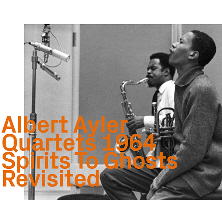 |
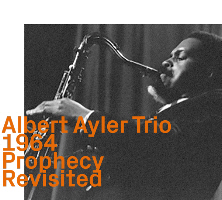 |
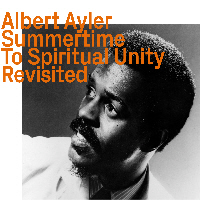 |
||||||||||||||||||||||||||||||||||||||||||||||||||||
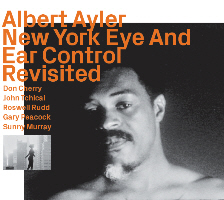 |
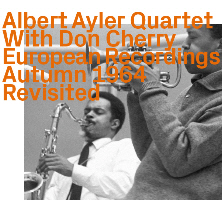 |
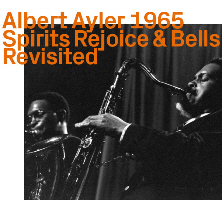 |
||||||||||||||||||||||||||||||||||||||||||||||||||||
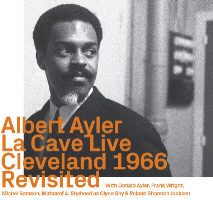 |
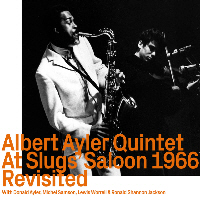 |
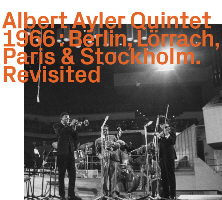 |
||||||||||||||||||||||||||||||||||||||||||||||||||||
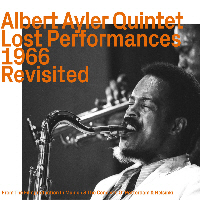 |
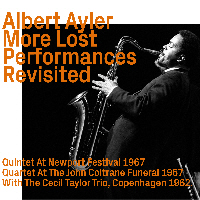 |
|||||||||||||||||||||||||||||||||||||||||||||||||||||
|
Peter Brötzmann (6/3/1941 - 22/6/2023) |
||||||||||||||||||||||||||||||||||||||||||||||||||||||
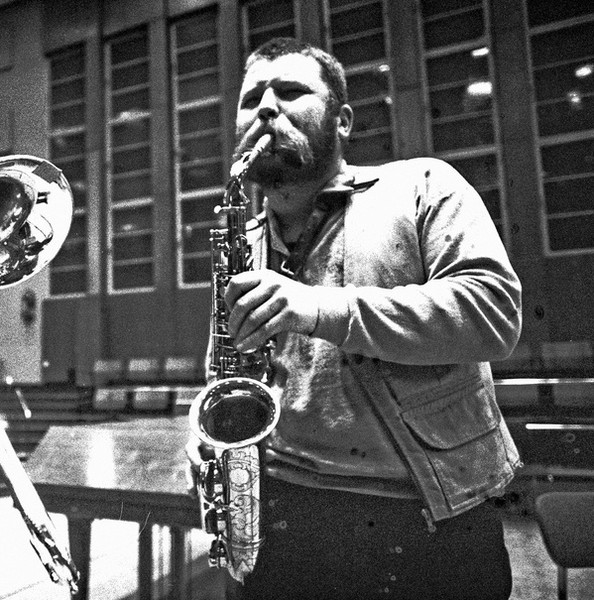 |
||||||||||||||||||||||||||||||||||||||||||||||||||||||
|
“.... And Somebody, Just Somebody, Please, Listen!” - that was the opening to Peter Brötzmann’s sleevenotes to the version of At Slug’s Saloon released on the German Jazz Door label as ‘In Memory Of Albert Ayler’. * Although he never played with Ayler, and although the last time I mentioned Peter Brötzmann in these pages, last September, was a quote from an article about the FMP label in Jazz Journal, in which he said he didn’t agree with Albert Ayler that music was a healing force of the universe, his link with Ayler is secure. There are many obituaries online, so take your pick from: The Guardian, Pitchfork, NPR, Stereogum, Citizen Jazz, Berliner Zeitung, and The Wire, which has the following note: ‘As a tribute to the German saxophonist who has died at the age of 82, we have made David Keenan’s epic two-part 2012 interview, as well as Daniel Spicer’s Primer guide to Brötzmann’s many recordings, free to read in our online library.’ ___ * As recounted elsewhere, this version of ‘Slugs’ was given to me by friend Clive after he’d also bought the two ‘Magic Music’ CDs (‘Truth Is Marching In’ and ‘Black Revolt’) and realised they were just another version of ‘Slugs’. That was the point when I decided to start doing this website. * Book News 1. Thanks to Alain Chauvat for letting me know about a new French book about Albert Ayler. |
||||||||||||||||||||||||||||||||||||||||||||||||||||||
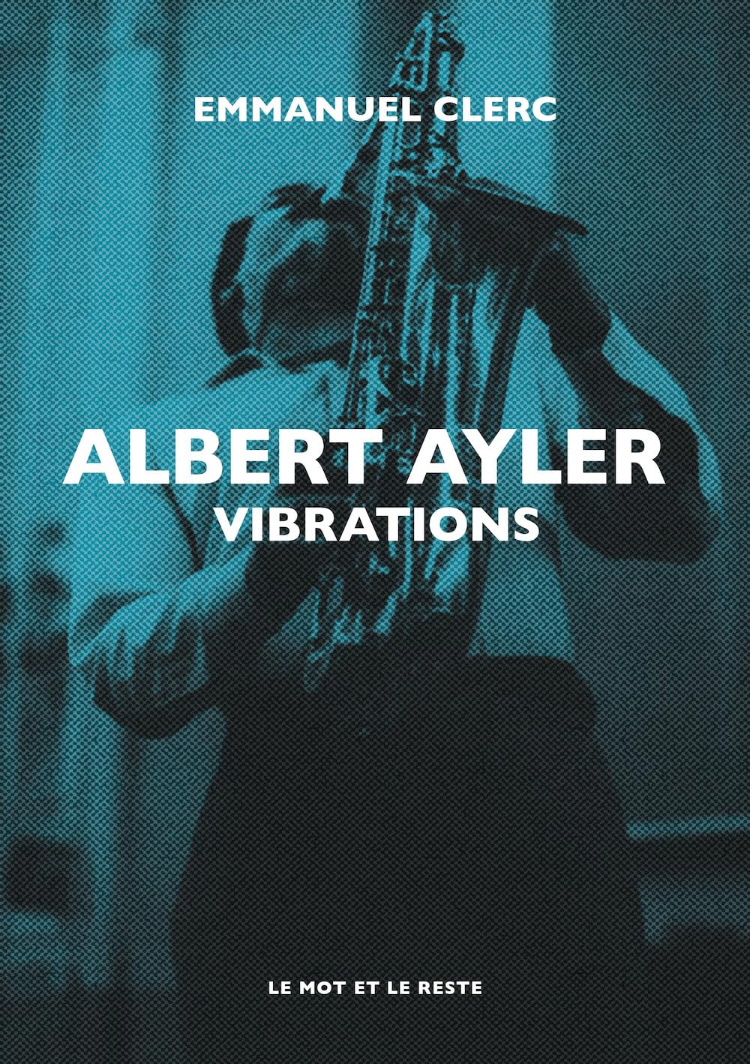 |
||||||||||||||||||||||||||||||||||||||||||||||||||||||
|
Albert Ayler: Vibrations by Emmanuel Clerc, was published by Le Mot Et Le Reste on 9th June, 2023. The blurb is as follows (courtesy of google): ‘Albert Ayler occupies a unique place in the history of jazz. A figure of the avant-garde in the sixties, his style and his intransigence sometimes arouse jubilation, sometimes confusion. Admired by John Coltrane, who saw in this other saxophonist the successor to his own experiments, his music nevertheless remains the secret of enlightened amateurs. From his childhood in Ohio, to his disappearance in the East River, passing through his European career and his triumph at the Maeght foundation in Saint-Paul-de-Vence, in 1970, this story traces the life of this musician. who has not yet been rediscovered for what he is: an artist of extraordinary dimensions. As much mystery as seduction, Albert Ayler's music prompts us to question the reasons for our fascination with black America and jazz, this intensely living art form that we cannot love if we do not embrace the cause.’ Radio France has a short feature on Albert Ayler, ‘Le Saxophone Incandescent d’Albert Ayler’, to accompany the publication of the book. 2. Staying in France, there’s a review of Nicholas Fily’s Don Cherry: Le Petit Prince Du Free (mentioned in May) on the Citizen Jazz site. 3. Bert Vuijsje’s review of Richard Koloda’s Holy Ghost: The Life and Death of Free Jazz Pioneer Albert Ayler, published in the March issue of Jazz Bulletin, the quarterly magazine of the Dutch Jazz Archive. I thought this was worth a special mention since Bert Vuijsje actually met Ayler and wrote that account of the recording of The Hilversum Session in 1964. * Record News Dirk Goedeking let me know about the re-release of several Ayler albums: 1. Something Different!!!!!! is being released on vinyl by Survival Research. |
||||||||||||||||||||||||||||||||||||||||||||||||||||||
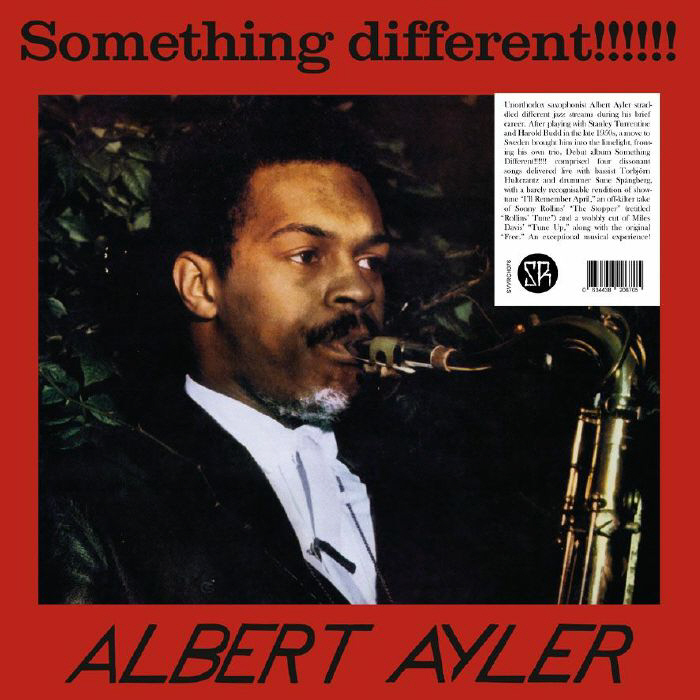 |
||||||||||||||||||||||||||||||||||||||||||||||||||||||
|
2. In Greenwich Village is also appearing on vinyl from Superior Viaduct. |
||||||||||||||||||||||||||||||||||||||||||||||||||||||
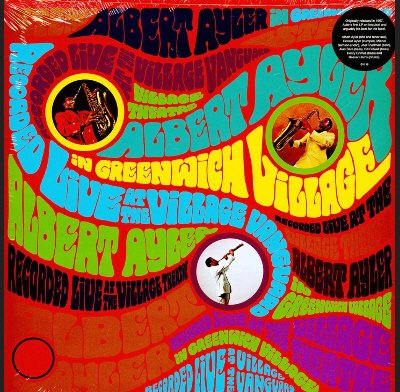 |
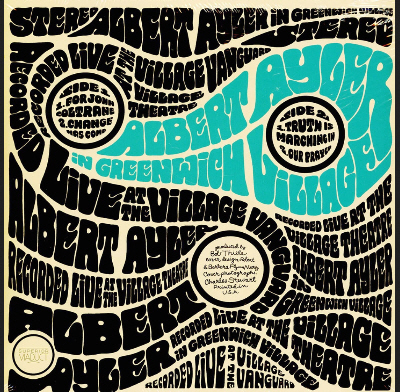 |
|||||||||||||||||||||||||||||||||||||||||||||||||||||
|
3. And Goin’ Home is released on vinyl by Muzak (Japan) - this is the 7 track LP version of Swing Low Sweet Spiritual, not the 10 track CD version, originally released as Goin’ Home. |
||||||||||||||||||||||||||||||||||||||||||||||||||||||
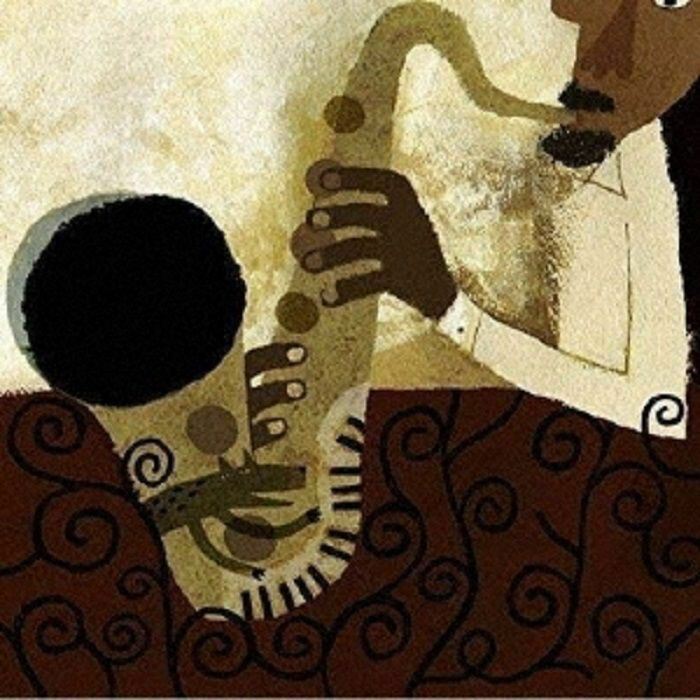 |
||||||||||||||||||||||||||||||||||||||||||||||||||||||
|
Other News 1. Here’s an update about the condition of Mars Williams (of ‘Ayler Xmas’ fame) and his current battle against cancer, mentioned last month. 2. There’s a long article about Michael Samson in the current issue of the German magazine Jazz Podium: Page 36 Page 37 Page 38 Page 39 3. There’s an interview with Roscoe Mitchell on youtube, where, at the 16:28 mark, Mr. Mitchell talks about meeting Mr. Ayler in France. 4. And on the NME site, the article, ‘Soundtrack Of My Life: Eric André’ takes us back to the beginning, with Eric’s choice of ‘Truth Is Marching In’ as “The song I want played at my funeral’. * And finally ... A year late for this one but luckily Dirk spotted it. Released on cassette on 13th July 2022, Happy Birthday, Mr. Ayler by Saxsquatch/Sutton/Smalligan. |
||||||||||||||||||||||||||||||||||||||||||||||||||||||
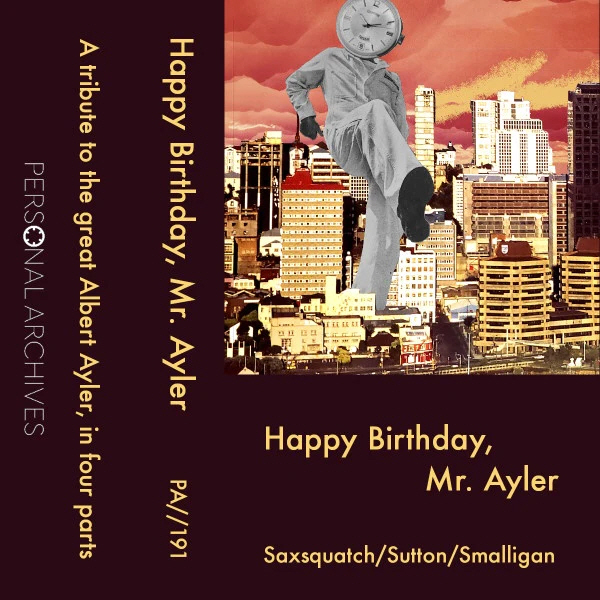 |
||||||||||||||||||||||||||||||||||||||||||||||||||||||
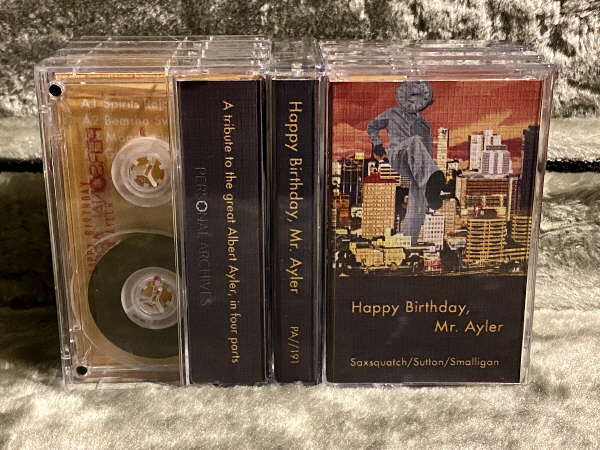 |
||||||||||||||||||||||||||||||||||||||||||||||||||||||
|
What’s New April to June 2023 has been sent to the vaults. ***
August 1 2023 |
||||||||||||||||||||||||||||||||||||||||||||||||||||||
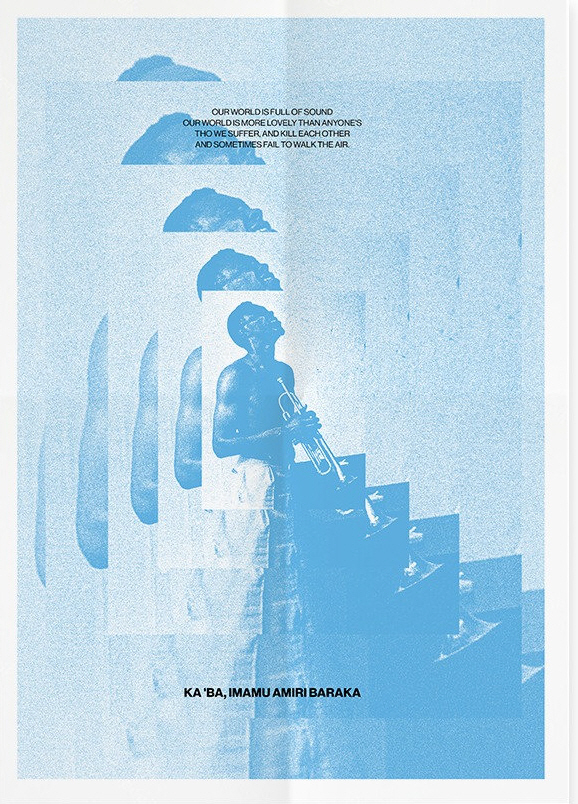 |
||||||||||||||||||||||||||||||||||||||||||||||||||||||
|
This poster, featuring Don Ayler, accompanies the new Portuguese translation of Amiri Baraka’s (Leroi Jones’) Black Music. Dirk Goedeking let me know about that, and it seems to set the tone for this month’s update on the world of Ayler, since this month it seems to lie adjacent to the worlds of various other fellows. For example, Cecil Taylor. Dirk sent me the poster for the original Cecil Taylor concerts at Stockholm’s Golden Circle where “Albert met Sunny”. |
||||||||||||||||||||||||||||||||||||||||||||||||||||||
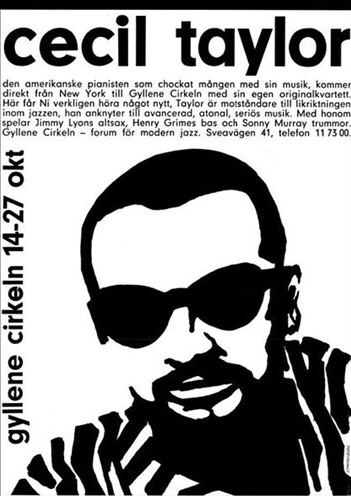 |
||||||||||||||||||||||||||||||||||||||||||||||||||||||
|
Which, I guess, does link to last month’s Hat Hut release of the Danish broadcast of the Cecil Taylor group with Albert Ayler on More Lost Performances (ezz-thetics 1160). This led Dirk to Jan Ström’s excellent site on Jimmy Lyons and this photo of the Cecil Taylor Quartet. |
||||||||||||||||||||||||||||||||||||||||||||||||||||||
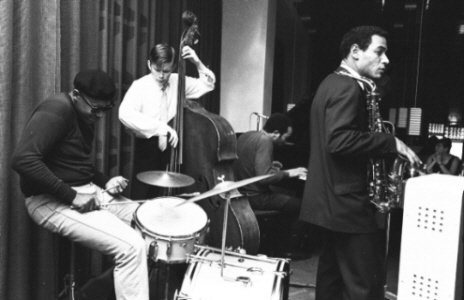 |
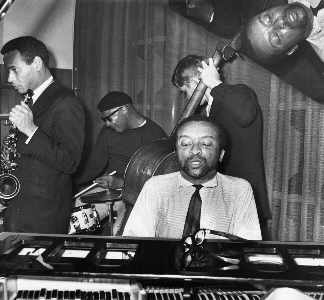 |
|||||||||||||||||||||||||||||||||||||||||||||||||||||
|
And, well-spotted, that’s not Henry Grimes on bass. Dirk writes: ‘The bass is played by the young Kurt Lindgren sitting in for Henry Grimes. Erik Admudsen had been supposed to substitute, but he refused after he heard the music. The translation of the Swedish poster is “Cecil Taylor - the American pianist, who shocked thoroughly with his music, comes directly from New York to the Golden Circle with his own original quartet. Here you really hear something new, Taylor is opposed to the categorization within jazz, he is connected to advanced, atonal serious music. He is joined by Jimmy Lyons on alto sax, Henry Grimes on bass and Sonny Murray on drums. Golden Circle - forum for modern jazz. Sveavägen 41, telephone 11 73 00.” This line-up of the Cecil Taylor Group was recorded and there are two items on youtube, an Italian bootleg and an extra track. Dirk winds up with this: ‘Looking through Jan Ström's site “Cacophony at Erikslust”, a review of their final European concert on 26.11.1962, caught my eye.’ This line-up included Albert Ayler. and here’s the review from a local paper of the concert at Club Erikslund, Malmö, Sweden: ‘Cacophony at Erikslust It is really not easy to create some kind of review from that kind of music which an astonished audience at Erikslust expired last night. [I should add a note here. Dirk sent me the links to the various pages on Jan Ström’s site, but I checked the Home Page as well and found this message: AFTERWORD: As far as I can remember (and I’ve checked the What’s Old pages) I missed Jan’s passing, for which I apologise. In the very early days of this site, Jan (who, at that time was working with the Ayler Records label which he had co-founded) was a great help to me.] * John Coltrane and Eric Dolphy Whose worlds collide on rediscovered sessions from the Village Gate in 1961. |
||||||||||||||||||||||||||||||||||||||||||||||||||||||
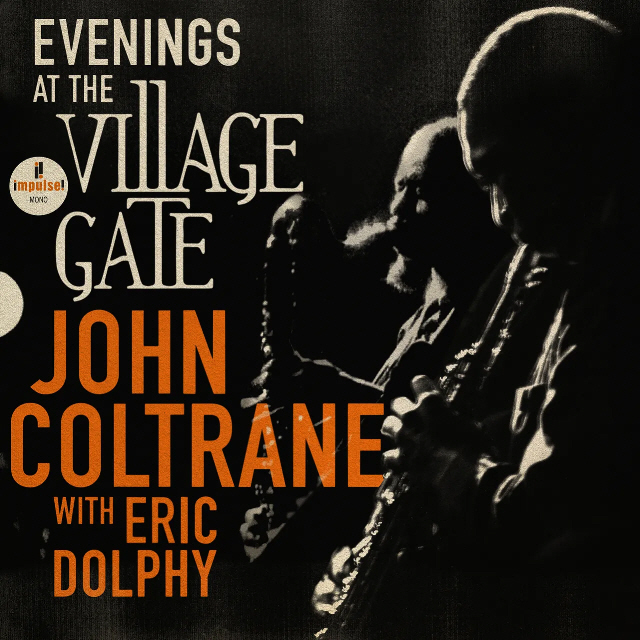 |
||||||||||||||||||||||||||||||||||||||||||||||||||||||
|
Information about the new album is available pretty much everywhere (Center Stage, Impulse) and there’s a review at the New Yorker by Richard Brody, which ends with the following: “The combination of ecstatic complexity and a folk form conjures, in advance, a musician who hadn’t yet made his mark in the wider musical world, but who would loom large in Coltrane’s and Dolphy’s careers and imaginations, and in jazz over all: Albert Ayler. Ayler burst onto the New York scene, in 1963, with a roaring and screeching and keening fervor that left behind conventional forms of rhythm and harmony but added the folk elements of spirituals, marches, and blues—and a realm of spirits and ghosts that inhabit those forms. Creating the ne plus ultra of the jazz avant-garde while reclaiming the prehistory that underlay it, Ayler reconceived its place in Black American culture. Coltrane was transformed by Ayler’s music; he invited Ayler to perform with him, adopted some of his most advanced methods, and when dying, of cancer, requested that Ayler play at his funeral. Dolphy (who also performed with Ayler in New York) expanded his own musical forms to reflect Ayler’s influence, too. While on tour in Europe in 1964, Dolphy was reportedly about to join Ayler’s band but, before he could do so, Dolphy died, in West Berlin, of diabetic shock. The Village Gate recordings of Coltrane and Dolphy show that Ayler was no mere singularity who burst meteor-like on the scene; he was the embodiment and avatar of musical ideas and ideals that were already in the air. Far from being solely the record of several great musicians’ bold explorations, the new release exemplifies, in its passionate strivings, the essence of jazz modernity and the spirit of the age.” [I should also add that, according to the Center Stage site, a new vinyl release of Love Cry is due in September.] * Roland Kirk There’s a feature in The New York Times (July 5th, 2023): ‘Five Minutes That Will Make You Love Avant-Garde Jazz This challenging subgenre, including the subset of free jazz, is driven by the fire of spontaneity, Lately The New York Times has asked jazz musicians, writers and scholars to share the favorites that would make a friend fall in love with Herbie Hancock, New Orleans jazz, Sun Ra or Mary Lou Williams. Now we’re putting the spotlight on avant-garde jazz, a challenging subgenre born out of the desire to do something that wasn’t as prescribed as bebop or post-bop, a sound carried by the fire of spontaneity by players who weren’t considered to be in the upper echelon of jazz. The definition of avant-garde jazz has been a point of contention since its inception. While the Association for the Advancement of Creative Musicians often played avant-garde that didn’t feel like jazz at all, others, like Amiri Baraka — on his 1972 album “It’s Nation Time” — fused poetry and polyrhythms to express a different side of the subgenre. Perhaps its biggest public advocate was the saxophonist and bandleader John Coltrane, who took an interest in free jazz — a subset of avant-garde jazz — in the mid-1960s and pushed for the saxophonists Albert Ayler and Pharoah Sanders to release their music on the mainstream label Impulse! Records. Today, the rules for what is and what isn’t avant-garde are still being written. The list below doesn’t aim to be comprehensive, but it represents a broad cross-section of avant-garde then and now, discussed by some of the foremost experimental musicians today. Enjoy listening to these songs chosen by a range of musicians, authors and critics. You can find a playlist at the bottom of the article, and be sure to leave your own favorites in the comments. Albert Ayler makes the cut with ‘Water Music’, but I mention this more for what you’ll find below. No connection with Albert, bar the article, but I’ve never come across this before - Roland Kirk and assembled supergroup on the Ed Sullivan Show in 1971. I apologise if this is old hat to you, but some of us lead more sheltered lives.
|
||||||||||||||||||||||||||||||||||||||||||||||||||||||
|
Ann Mack I must admit to an unfamiliarity with the work of the singer Ann Mack, but an article popped up on the Local News Matters site relating to the San Francisco Bay Area and a concert at Grace Cathedral: ‘“I always knew I wanted to sing. I don’t think I vocalized it, but I felt it,” says Ann Mack, a lifelong performer and, at 85, a relative newcomer to the Bay Area jazz scene. Hailing from Cleveland with a family history linked to the evolution of jazz, Mack’s preferred songs are the standards: Gershwin tunes like “A Foggy Day” and “Embraceable You,” Fats Waller’s “Ain’t Misbehavin’” and perennials like “April in Paris,” and her all-time favorite, “Night and Day.” “I will never forget that song; I’m from the rock ’n’ roll era, but I wasn’t a rock and roller,” adds Mack, who appears this week in San Francisco with the St. John Coltrane Church Ensemble, founded and led by her sister and brother-in-law Marina and Franzo King. Their Sonic Ascension Vesper jazz worship service in Grace Cathedral on July 21 commemorates saxophone genius Coltrane and Billie Holiday. (Both died on July 17; Holiday in 1959, Coltrane in 1967.)’ Later on in the article there was this: ‘Then she found a kindred spirit in pianist and vocalist Bobby Few. “I was 18 and he was 21. He was one of the first people I sang with in Cleveland and he was just a sweetie pie,” she says. Few would eventually move on to New York and ultimately Paris and become known for his work with avant-garde musical pioneer Albert Ayler, among other jazz luminaries. “I went to high school with Albert Ayler,” says Mack, “Oh my God, I was scared of him. He was a couple of years older than me and he didn’t fool around with us kids. He was out there making money. He had his own car, a Cadillac. And he didn’t dress like a kid. He had a suit on.” The elegance and maturity of jazz style also appealed to Mack.’
Jeff Schwartz Talk of Jan Ström and the early days of this site brings back memories of the very first time I went on the internet and put ‘Albert Ayler’ into a search engine - no idea now, which search engine, something before google. All that came up was Jeff Schwartz’s biography of Albert, and when I eventually decided to do this site, the information on Jeff’s site was crucial. So here’s Jeff on Cathy Segal-Garcia’s Noontime Hang on youtube (that wasn’t there then either):
|
||||||||||||||||||||||||||||||||||||||||||||||||||||||
|
And finally ... Manfred Mann Before we get on to Manfred Mann, I should mention that the World Radio History site has a large collection of old music magazines, including Melody Maker. I have found a couple of interesting items relating to Albert Ayler - Richard Williams’ fairly complimentary review of New Grass, and this review of the infamous L.S.E. concert, which I’ve repeated here since it does state that the Ayler group played two sets, which I don’t think has ever been mentioned before - so maybe that’s just a mistake:
Melody Maker (26 November, 1966 - p.8) ‘LONDON BOB HOUSTON |
||||||||||||||||||||||||||||||||||||||||||||||||||||||
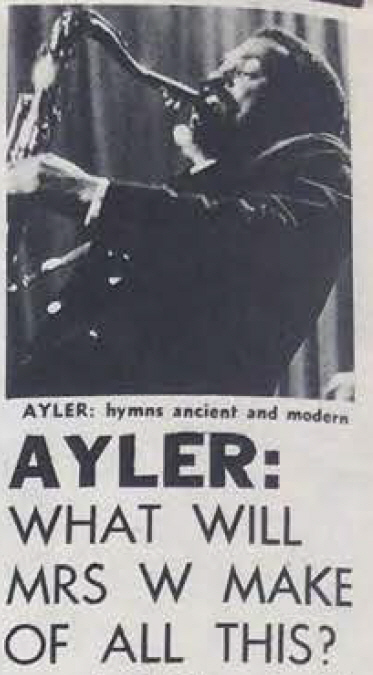 |
||||||||||||||||||||||||||||||||||||||||||||||||||||||
|
THE Albert Ayler Quintet's short visit to Britain last week to film for BBC2's Jazz Goes To College series was hardly an uneventful trip. And now, Manfred Mann, who was the subject of the ‘Pop Think In’ feature in the Melody Maker of 29th January, 1966 (page 7). This seems to be a quick-fire Q&A rather similar to those word association games beloved of psychiatrists. So we get Manfred’s responses to ‘Adolf Hitler: I hope to God we never see the likes of him again’ and ‘Herman: Cute, sweet and rich. I obviously don’t really like the sort of music he plays. I don’t feel terrible strongly about him.’ I assume that’s the Herman of Hermit fame and not Woody. Carla Bley elicits the response, ‘Who the hell is Carla Bley?’ which prompts the explanatory note: ‘CARLA BLEY is a pianist-composer prominent in New York avant garde jazz circles.’ And now we come to Albert Ayler: |
||||||||||||||||||||||||||||||||||||||||||||||||||||||
 |
||||||||||||||||||||||||||||||||||||||||||||||||||||||
|
I have a feeling that there is probably a need for some elucidation for our foreign readers. ‘Public’ in this context means ’private’, and a ‘fag’ is a younger pupil who is engaged as an unpaid servant by an older pupil. Make of ‘beaten’ what you will. ***
September 1 2023 |
||||||||||||||||||||||||||||||||||||||||||||||||||||||
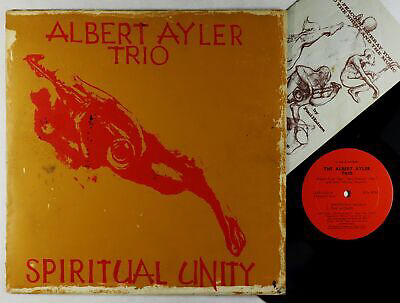 |
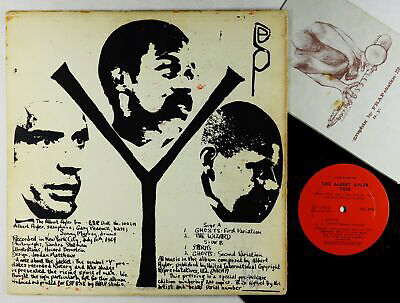 |
|||||||||||||||||||||||||||||||||||||||||||||||||||||
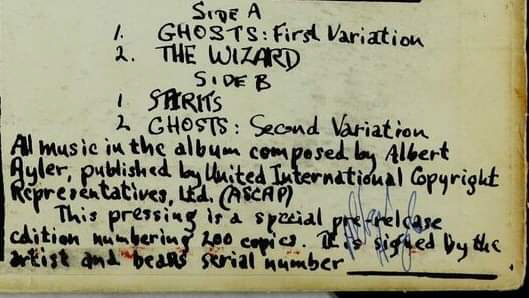 |
||||||||||||||||||||||||||||||||||||||||||||||||||||||
|
$3,739 That was the price paid for one of the original 200, autographed copies of Spiritual Unity, on 30th July, 2023, in an ebay auction. Details are on the popsike site, and include the following description: Albert Ayler Trio Spiritual Unity (ESP-Disk') Pressing features: US pressing, ear in deadwax, limited edition of 200, mono, pre-release Vinyl grade: VG+ ⓘ Visual grade of vinyl Scroll down to see grading scale Cover type/grade: hand-painted jacket, VG, ink spotting on front and back, autographed by Albert Ayler on back cover, unnumbered Other contents: booklet I feel as though I should be more excited about this than I am - I don’t possess the collector gene and so can’t really comment. Checking this site, I found on the Spiritual Unity page, that “In July 2002 one of the original signed copies of Spiritual Unity was sold on ebay for $1,725.” So I guess that’s inflation for you. * Still swinging Thanks to Dirk Goedeking for the above, and also for these ‘new’ releases from: Roscoe Mitchell: |
||||||||||||||||||||||||||||||||||||||||||||||||||||||
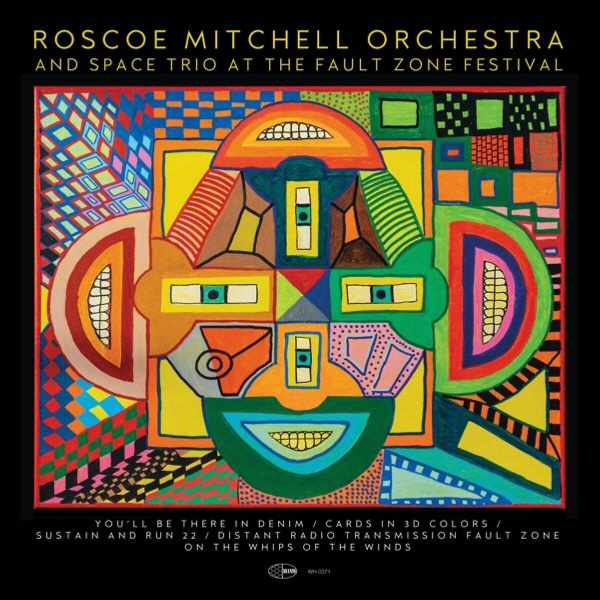 |
||||||||||||||||||||||||||||||||||||||||||||||||||||||
|
Released in June this year, full details of Roscoe Mitchell Orchestra and Space Trio at the Fault Zone Festival can be found at Wide Hive Records The Art Ensemble Of Chicago: |
||||||||||||||||||||||||||||||||||||||||||||||||||||||
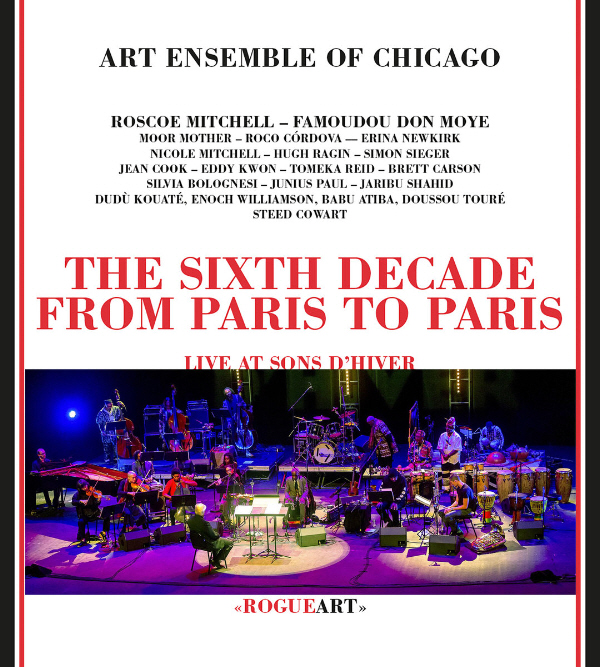 |
||||||||||||||||||||||||||||||||||||||||||||||||||||||
|
Marking the sixth decade of the Art Ensemble of Chicago, Rogue Art released in January this year a live recording of the band at the Sons d’Hiver Festival in February, 2020. Full details and download on bandcamp. and Wadada Leo Smith: |
||||||||||||||||||||||||||||||||||||||||||||||||||||||
 |
||||||||||||||||||||||||||||||||||||||||||||||||||||||
|
And from March this year, and also on bandcamp, Fire Illuminations by Wadada Leo Smith and Orange Wave Collective. * A couple of things from London Jazz News Which, luckily, is not confined to the Great Wen. First, this concert/event from St. Giles’ Cathedral in Edinburgh by Tommy Smith and Maria Rud - Luminescence. Sadly now past, but some startling pictures remain. It’s a follow-up to their 2021 collaboration with the Scottish National Jazz Orchestra, Where Rivers Meet, which was dedicated to the music of Albert Ayler and Ornette Coleman. And then there’s this list of ‘Ten tracks by Cecil Taylor I can’t do without...’ by Noah Stoneman, which includes Mr. Taylor’s only recording with Mr. Ayler, recently included in Hat Hut’s More Lost Performances Revisited. * Don Cherry The latest issue of The Wire (No. 475) is a Don Cherry special, with “18 pages of essays on Don Cherry and his organic music family.” There is also this piece online by Harmony Holiday focusing on the 1971 Daniel Caux recording of Don talking about Albert. * Passages There’s a ‘new’ film from France featuring a snatch of Albert Ayler on the soundtrack. It’s called Passages, directed by Ira Sachs and starring Franz Rogowski, Ben Whishaw and Adèle Exarchopoulos. I mentioned it back in January when there was a review of its Sundance showing by Jonathan Romney on the Screendaily site and I duly added it to the sparse Ayler filmography. I’m giving it another mention now, since it’s official American release has led to some new reviews, many of which mention Ayler. There’s one from Richard Brody in The New Yorker, which ends with this: ‘Alongside all this diegetic music, integrated into the texture of the drama, there is one glorious needle drop, planted by Sachs on the soundtrack at a climactic moment of the action, that serves as the movie’s aesthetic center. The track that Sachs uses does more than just inflect the sequence with its surprisingly extravagant expressivity. The scene, of Tomas’s exalted response to the turbulence of his life—he bikes fast through Paris, in a series of onrushing, exhilarating, increasingly intimate tracking shots—is accompanied by a classic of modern music, a fragment of the title track of Albert Ayler’s 1965 live album, “Spirits Rejoice.” The music is a wild yet wry burst of free jazz (which also incorporates a fragment of “La Marseillaise”), and it serves not just as a mood-adjusting adornment but as a severe test of viewers’ sensibility. Those who hear it as formlessly vehement chaos have, in effect, passed priggish judgment not just on Ayler and his band but on Tomas, on Sachs, and on the realm of emotional and sexual freedom that “Passages” explores. That realm is more than a personal prerogative. It is the crucible of imagination, the hallmark of progressive politics, and the essence of art.’ [Just to be pedantic for a minute, Spirits Rejoice is often referred to as a ‘live album’ - I think because the recording venue was Judson Hall, rather than a recording studio. But there was no audience, as Guy Kopelowicz’s excellent photos attest.] A review in the Santa Barbara Independent sent me checking my own site: ‘Despite the various tendrils of friction within the plot, one of the most memorable scenes has a stark simplicity: As our troubled and now romantically unplugged hero manically rides his bicycle, with the sound of free jazz titan Albert Ayler’s “Spirit Rising” aptly frazzling the soundtrack. The late, great Ayler managed to combine avant-garde impulses and pained emotionality, a paradoxical goal Sachs strives for, and almost gets to with his latest.’ In that first Screendaily review this description “The music is an off-beat mix, ranging from an English a capella folk song by Janet Penfold to a blast of Albert Ayler’s free-jazz take on the ‘Marseillaise’. The latter accompanies one character’s breakneck bike ride through Paris, bringing a final Nouvelle Vague flourish to a film that wears its borrowed Frenchness with seductive grace and panache.” made me wonder whether Ayler was chosen as an hommage to an earlier film, Patrice Cheréau’s L’Homme Blessé (‘The Wounded Man’) in which “a blast from avant-garde jazz artist Albert Ayler’s sax heralds Henri (Jean-Hugues Anglade) and his family racing for a bus to the train station from which his younger sister will leave for her student vacation.” But, I think I was being too clever by half, since this interview with Ira Sachs on the A Frame site, makes no mention of the earlier film. A Frame: The silence is very evident and present in the last scene in the movie, as Tomas is cycling through Paris. It must have been logistically tricky to execute, because you didn't close roads for this. Was that difficult? Did you ever wish you hadn't set yourself this challenge? Ira Sachs: Franz Rogowski is an unbelievable bicyclist who is comfortable with speed and risk, and that's how he lives in Paris and Berlin. It's really a part of him, so I wrote the scene knowing his relationship between the bike and the city, and we were just there to capture it. I had a great cinematographer, Josée Deshaies, and the images she created in that last moment are purely cinematic. I feel like it's not just an accident, but is the accident of the characters interacting with the city of Paris at the end of a film that has primarily been a movie of interiors, with Albert Ayler playing this beautiful piece of music, "Spirits Rejoice," written in the mid-'60s, this violent combustive jazz full of the same kind of conflict as the images. We tried to make a piece of cinema. The trailer for Passages includes bits of the bike ride but without ‘Spirits Rejoice’. * ‘Ghosts’ on youtube So, what’s new? This is actually an old video from 2011, which used to be on vimeo, but that link has broken and its new home is on youtube. “'Ghosts' was a collaborative work by Derek Horton with the artist Eoin Shea and the musicians Paul Hession (percussion) and Leon Thomas Johnson (tenor saxophone). This first performance of 'Ghosts' was screened and performed in Holy Trinity Church in Leeds, UK on 7 October 2011. Hession and Johnson improvised to two large twin-screen film projections by Horton and Shea. The project was a tribute to the legendary musician Albert Ayler, 41 years after his death in New York at the age of 34. After falling from the Staten Island ferry in mysterious circumstances, Ayler's body was found on 25 November 1970.”
|
||||||||||||||||||||||||||||||||||||||||||||||||||||||
|
There’s a second extract, and an earlier piece, ‘Ghosts (#1)’. * And finally . . . Who’s the bigger Ayler fan? The person who spent $3,739 on a rare copy of Spiritual Unity, or this guy, who Dirk Goedeking came across on Instagram: ‘Albert’s 87th birthday was celebrated by Arthur Edmaiston, a tenor player from East Memphis, writing: “The guy on my shirt is the immortal saxophonist Albert Ayler. July 13 is his birthday. The young fella standing next to me is my son Ayler who is named for the legendary musician.”’ |
||||||||||||||||||||||||||||||||||||||||||||||||||||||
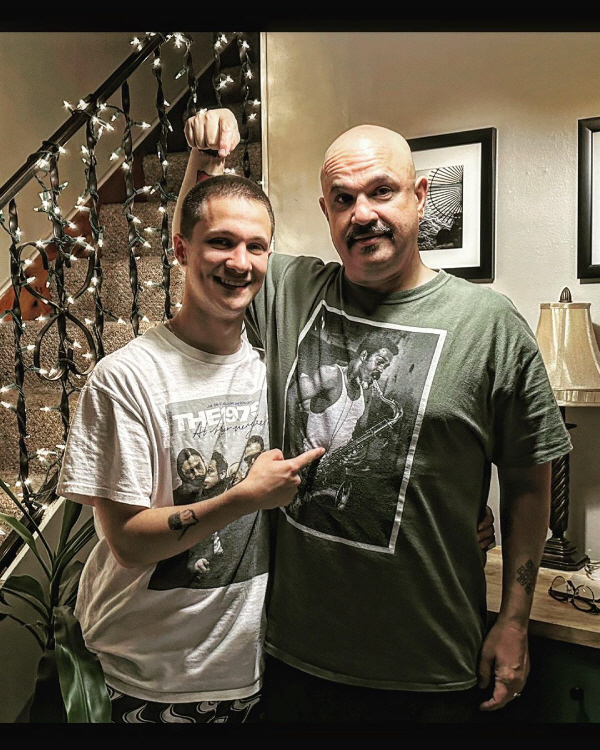 |
||||||||||||||||||||||||||||||||||||||||||||||||||||||
|
*** News from 2004 (January - June) 2004 (July - December) 2005 (January - May) 2005 (June - December) 2010 (January - June) 2010 (July - December) 2011 (January - May) 2011 (June - September) 2011 (October - December) 2012 (January - May) 2012 (June - December) 2013 (January - June) 2013 (July - September) 2013 (October - December) 2014 (January - June) 2014 (July - December) 2015 (January - May) 2015 (June - August) 2015 (September - December) 2016 (January - March) 2016 (April - June) 2016 (July - August) 2016 (September - December) 2017 (January - May) 2017 (June - September) 2017 (October - December) 2018 (January - May) 2018 (June - September) 2018 (October - December) 2019 (January - May) 2019 (June - September) 2019 (October - December) 2020 (January - April) 2020 (May - August) 2020 (September - December) 2021 (January - March) 2021 (April - July) 2021 (August - December) 2022 (January - April) 2022 (May - August) 2022 (September - December) 2023 (January - March) 2023 (April - June) 2023 (October - December) 2024 (January - March) 2024 (April - June) 2024 (July - September) 2024 (October - December) 2025 (January - March)
|
||||||||||||||||||||||||||||||||||||||||||||||||||||||
|
Home Biography Discography The Music Archives Links What’s New Site Search
|
